*NURSING > QUESTIONS & ANSWERS > ANCC _American Nurses Credentialing Center (ANCC). Practice Questions and Answers with Complete Solu (All)
ANCC _American Nurses Credentialing Center (ANCC). Practice Questions and Answers with Complete Solutions
Document Content and Description Below
ANCC Practice Questions and Answers with Complete Solutions In the early stages of iron deficient anemias, blood studies show: (a) macrocytic normochromic (b) microcytic hypochromic (c) normochro... mic normocytic (d) pancytopenic hypocytic Correct Answer-(a) normochromic normocytic A 14-year-old, male patient has some general concerns about eczema, as his twin brother was recently diagnosed with this condition. The patient reports urticaria and a rash on his posterior knees bilaterally. The three factors that put the patient at risk for eczema are a family history of eczema, a personal history of allergic rhinitis, and a history of: (a) asthma (b) bee allergy (c) otitis media (d) psoriasis Correct Answer-(a) asthma A patient has hyperactive reflexes of the lower extremities. The adult-gerontology primary care nurse practitioner assesses for ankle clonus by: (a) firmly applying a low-pitched tuning fork to the lateral malleolus. (b) flexing the leg at the knee, rotating it externally, and striking the Achilles tendon with the percussion hammer. (c) sharply dorsiflexing the foot and maintaining this position while supporting the knee.(d) stroking the lateral aspect of the sole from the heel to the ball of the foot with the sharp end of the percussion hammer. Correct Answer-(c) sharply dorsiflexing the foot and maintaining this position while supporting the knee. A 70-year-old, female patient is having her yearly evaluation. The adult-gerontology primary care nurse practitioner gives which physical examination finding the highest priority for immediate treatment? (a) Atrophy of vaginal rugae. (b) Cystocele present. (c) Palpable ovary. (d) Pessary in place. Correct Answer-(c) Palpable ovary. The adult-gerontology primary care nurse practitioner reminds a 16-year-old, male patient who just received his driver's license to wear a seat belt at all times when in a car. The patient replies that he does not need to wear a seat belt, because nothing will happen to him if he is involved in an automobile collision. According to the health belief model, what chief component does the patient lack? (a) Enabling factors. (b) Motivation. (c) Perceived role conflict. (d) Perceived severity. Correct Answer-(d) Perceived severity. The adult-gerontology primary care nurse practitioner treats several patients for biological exposure. In the patients' records, the nurse practitioner documents which epidemiological factors for each exposure? (a) Comorbidities and length of exposure. (b) Location and event intensity. (c) Mode of transmission and incubation. (d) Premorbid conditions and surveillance rates. Correct Answer-(c) Mode of transmission and incubation.When disseminating research findings in a peer-reviewed journal, the adult-gerontology primary care nurse practitioner: (a) concludes that the study proves the hypothesis. (b) excludes the discussion section, because the conclusion contains this information. (c) recommends incorporating the results directly into clinical practice. (d) uses the methodology section to support the validity of the study. Correct Answer-(d) uses the methodology section to support the validity of the study. A patient's adult child telephones the adult-gerontology primary care nurse practitioner to inquire about the patient's illness. The patient's child reports that the parent relies upon the child to explain everything to him or her. The nurse practitioner: (a) asks the child to provide a copy of the patient's advance directive document. (b) assures the child that the nurse practitioner can disclose requested information. (c) informs the child that he or she must come to the clinic to discuss the parent's case. (d) tells the child that the nurse practitioner can discuss the information only with the patient. Correct Answer-(d) tells the child that the nurse practitioner can discuss the information only with the patient. The adult-gerontology primary care nurse practitioner is appointed to a hospital's multidisciplinary medical ethics review committee. The nurse practitioner's role is to: (a) evaluate standards, risks, benefits, and outcomes. (b) identify how to anticipate and resolve similar future situations.(c) investigate the need for disciplinary action. (d) obtain agreement of all parties with a chosen solution. Correct Answer-(a) evaluate standards, risks, benefits, and outcomes. To improve the quality of clinical practice, the adult-gerontology primary care nurse practitioner: (a) charges a fee for patients who arrive late to clinic appointments. (b) disseminates research study results to colleagues. (c) expresses opinions about alternative therapies with patients who consider such treatments. (d) schedules time during clinic hours to meet with pharmaceutical representatives. Correct Answer-(b) disseminates research study results to colleagues. One effect of using electronic health record applications, such as telemedicine and portable monitoring systems, has been to: (a) create stand-alone clinics. (b) decrease billable visits. (c) increase risks to patients. (d) open access to care. Correct Answer-(d) open access to care. The adult-gerontology primary care nurse practitioner evaluates an 80-year-old patient with cognitive deficits, who is unaccompanied by the adult child who typically is present. The patient has urinary symptoms, for which the nurse practitioner considers ordering sulfamethoxazole-trimethoprim (Bactrim). The patient's previous medical record is unavailable. Before prescribing the medication, the nurse practitioner: (a) contacts the patient's adult child.(b) queries the other staff members. (c) relies on the patient's self-report. (d) waits until the patient's chart is available. Correct Answer-(a) contacts the patient's adult child. The adult-gerontology primary care nurse practitioner conducts a small group class on weight management. The nurse practitioner anticipates that the patient who may have the greatest difficulty implementing the counseling is the: (a) extroverted patient raising his or her grandchildren. (b) introverted patient who does not speak in the group. (c) personable patient who lives with his or her children. (d) worried patient whose son is serving in military conflict. Correct Answer-(d) worried patient whose son is serving in military conflict [Show More]
Last updated: 9 months ago
Preview 1 out of 43 pages
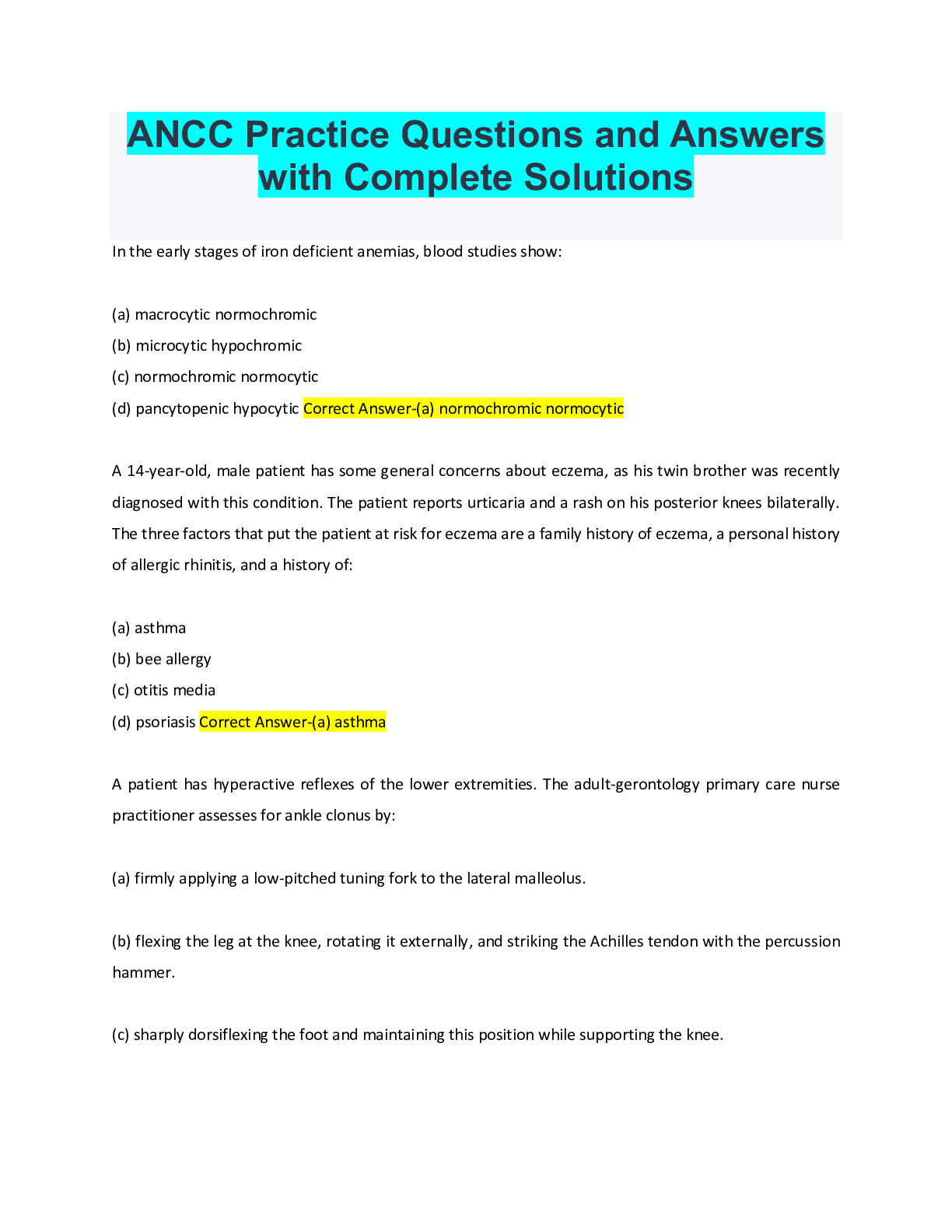
Also available in bundle (1)
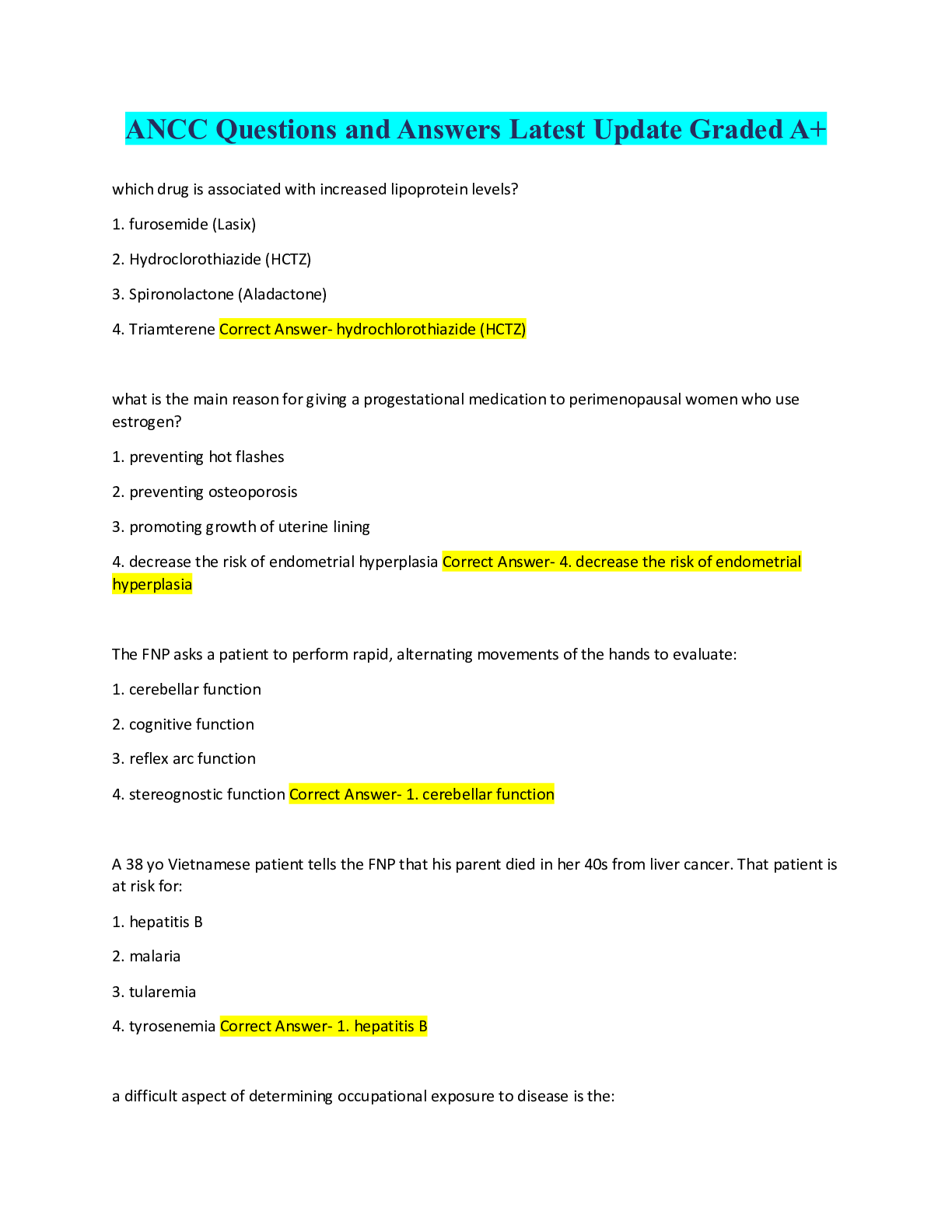
ANCC Exam FULL SOLUTION PACK(ALL ANCC Exams AND STUDY QUESTIONS ARE HERE ,ALL ANSWERED CORRECTLY)
ANCC Exam FULL SOLUTION PACK(ALL ANCC Exams AND STUDY QUESTIONS ARE HERE ,ALL ANSWERED CORRECTLY)
By Alphascore 1 year ago
$12
4
Reviews( 0 )
Document information
Connected school, study & course
About the document
Uploaded On
Nov 14, 2022
Number of pages
43
Written in
Additional information
This document has been written for:
Uploaded
Nov 14, 2022
Downloads
1
Views
131


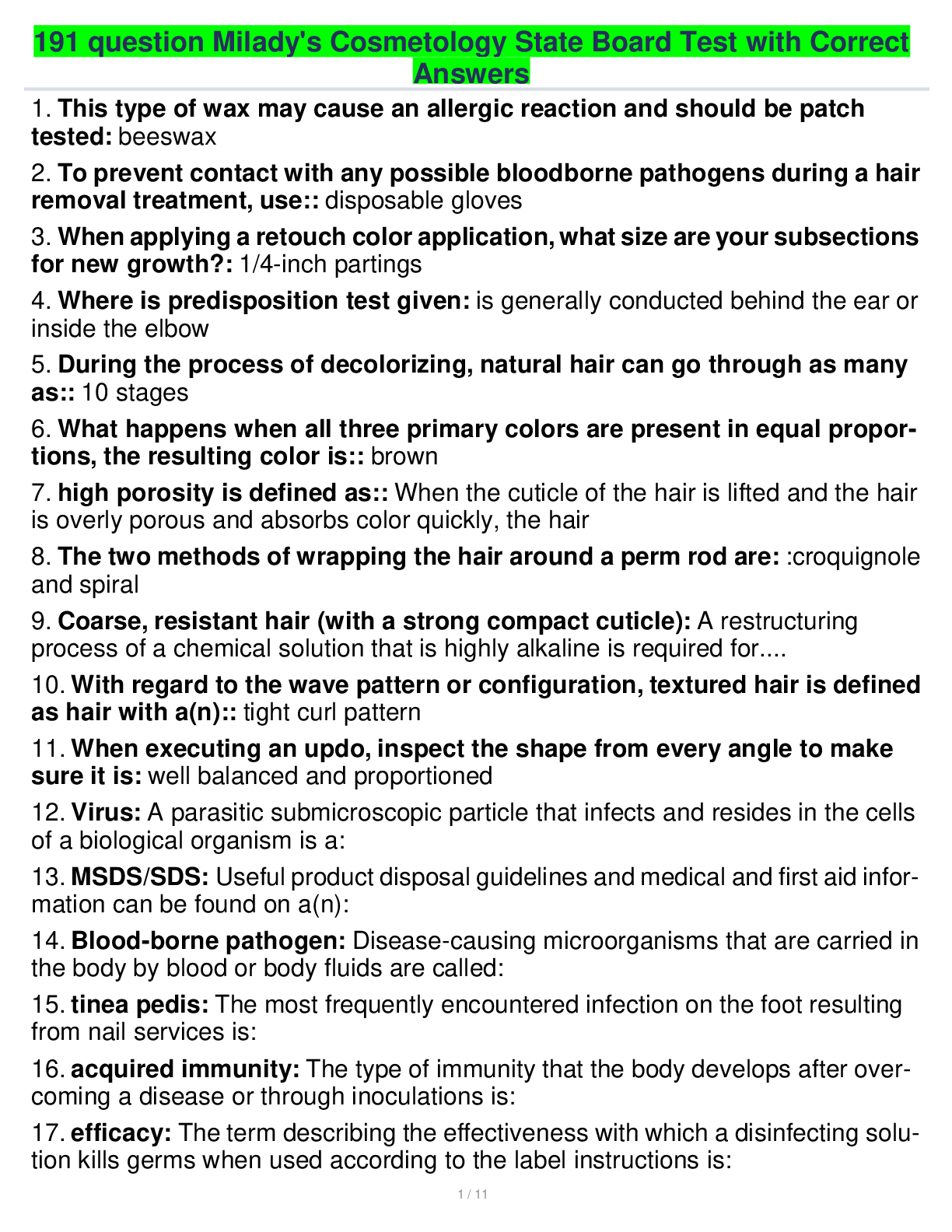
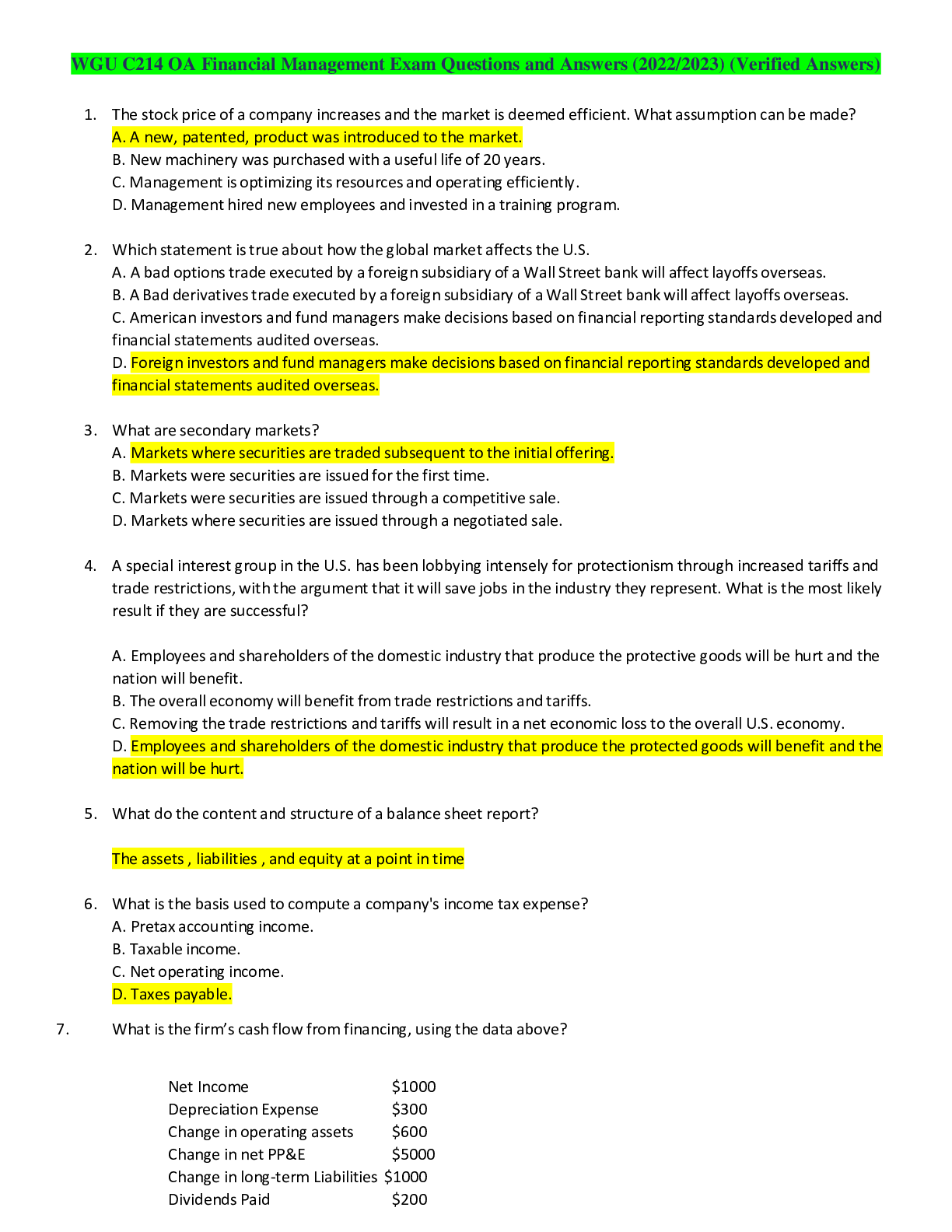
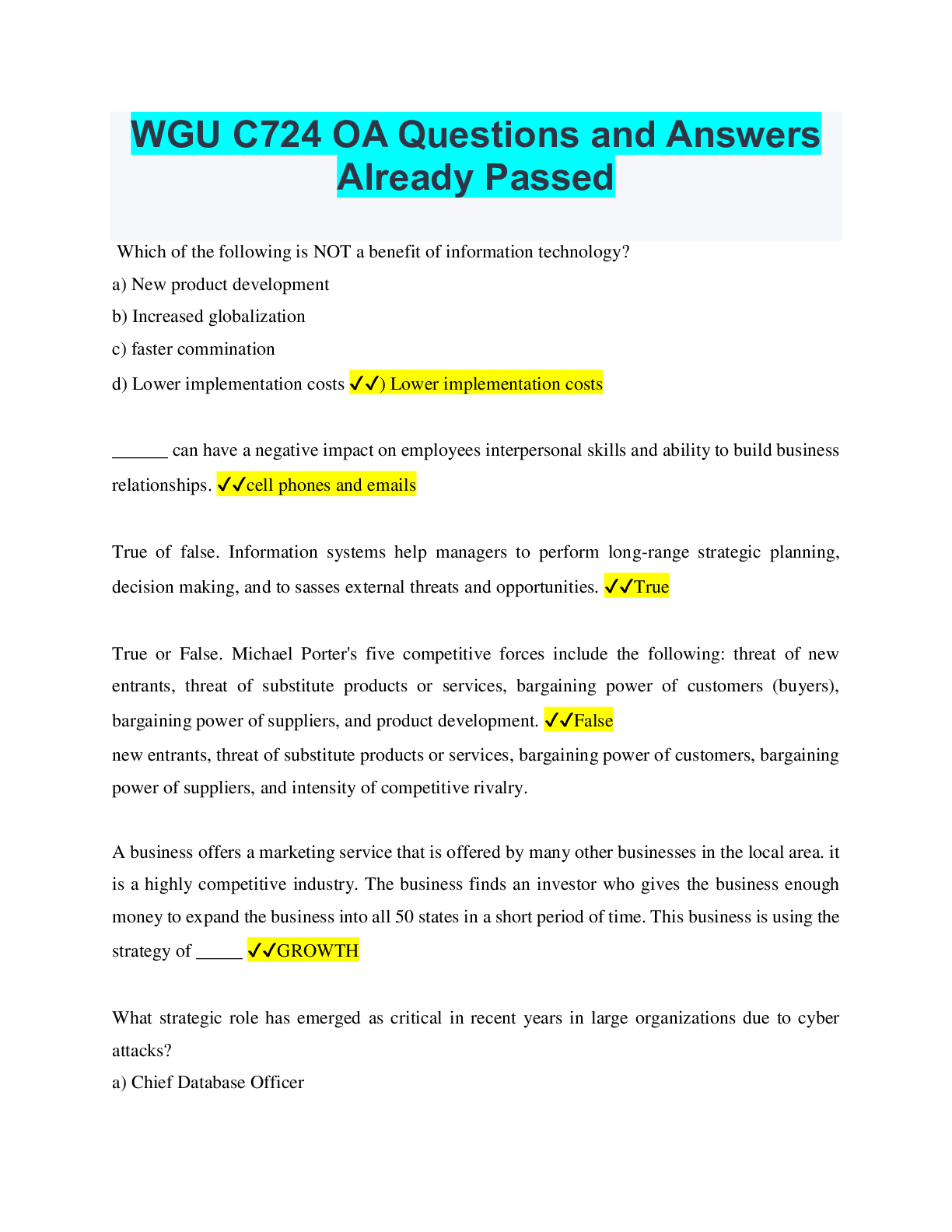
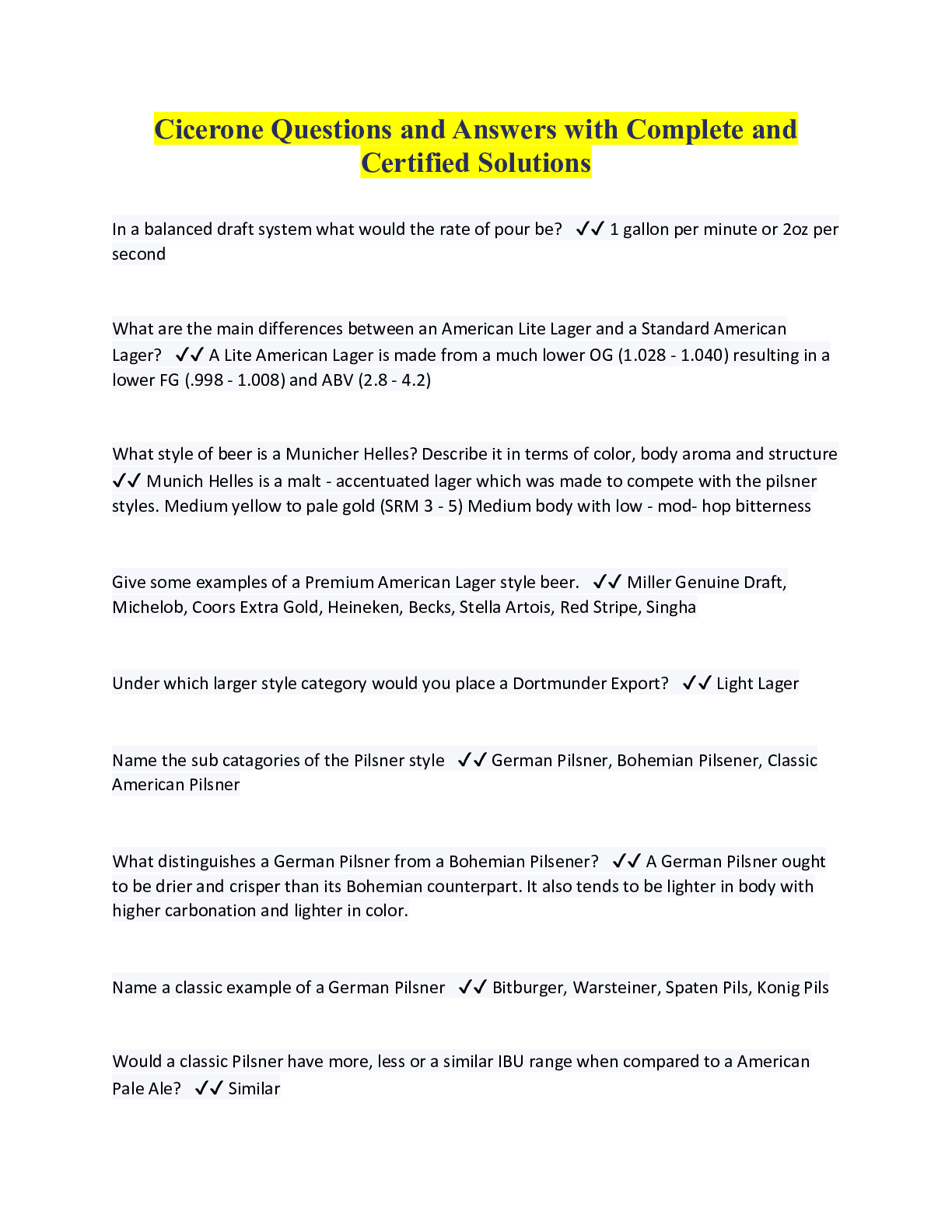
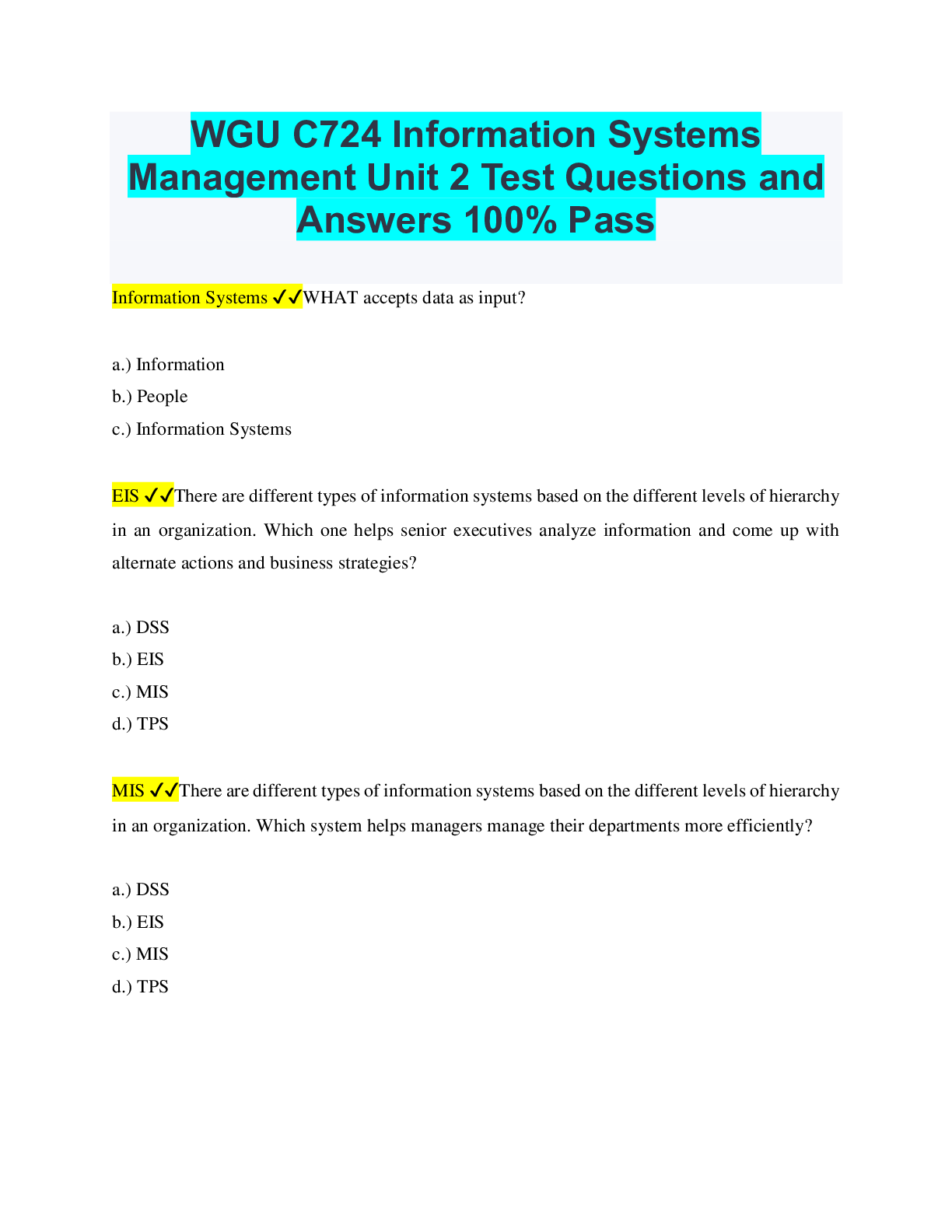
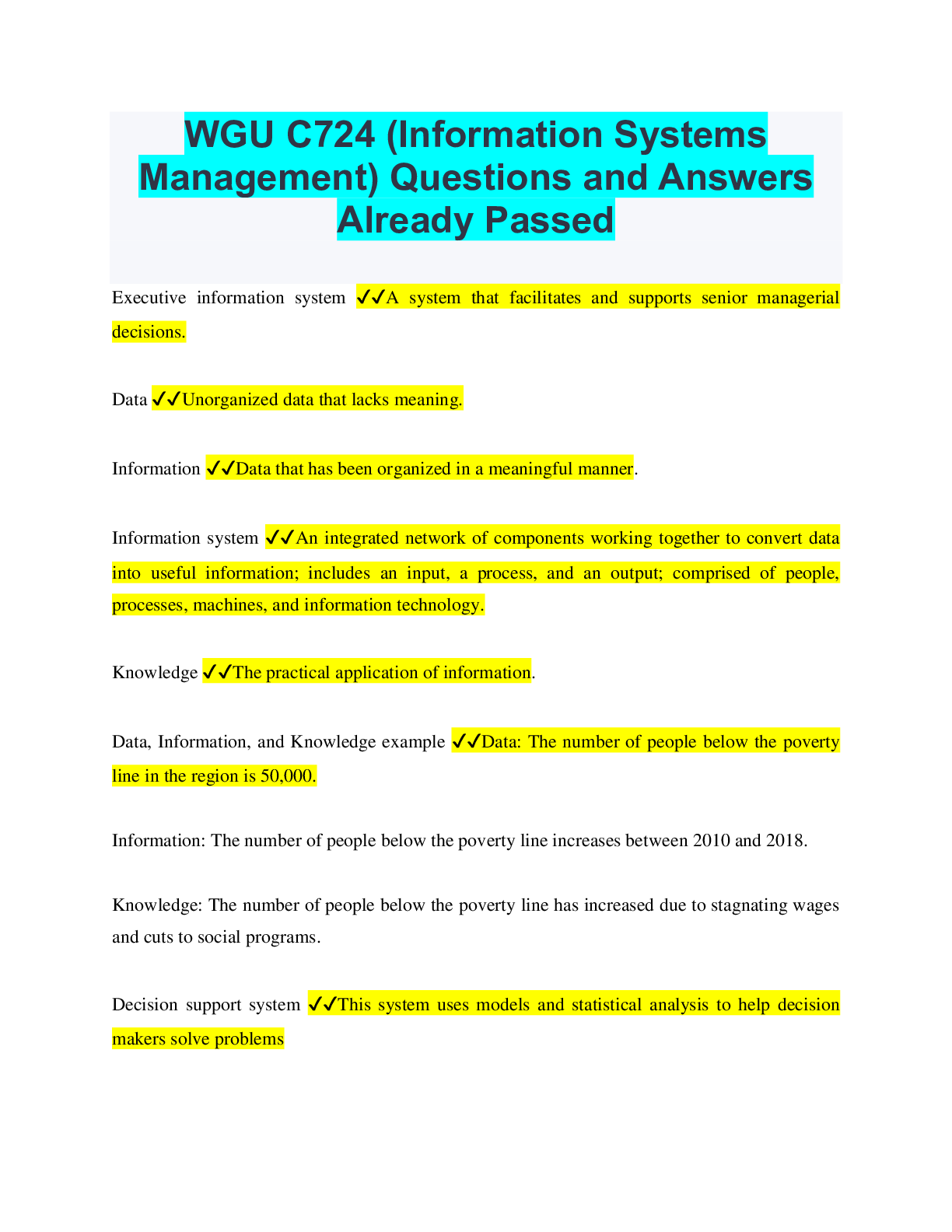
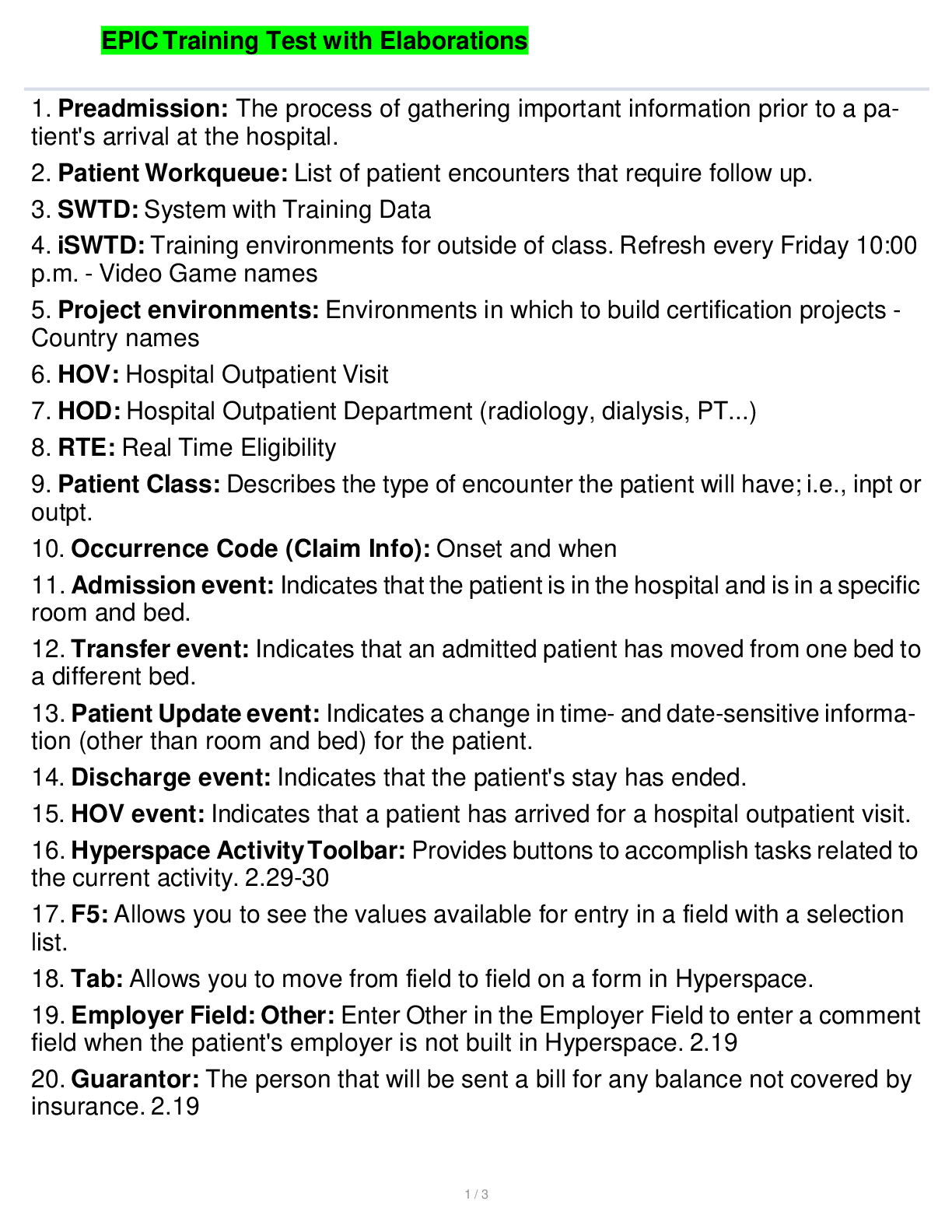

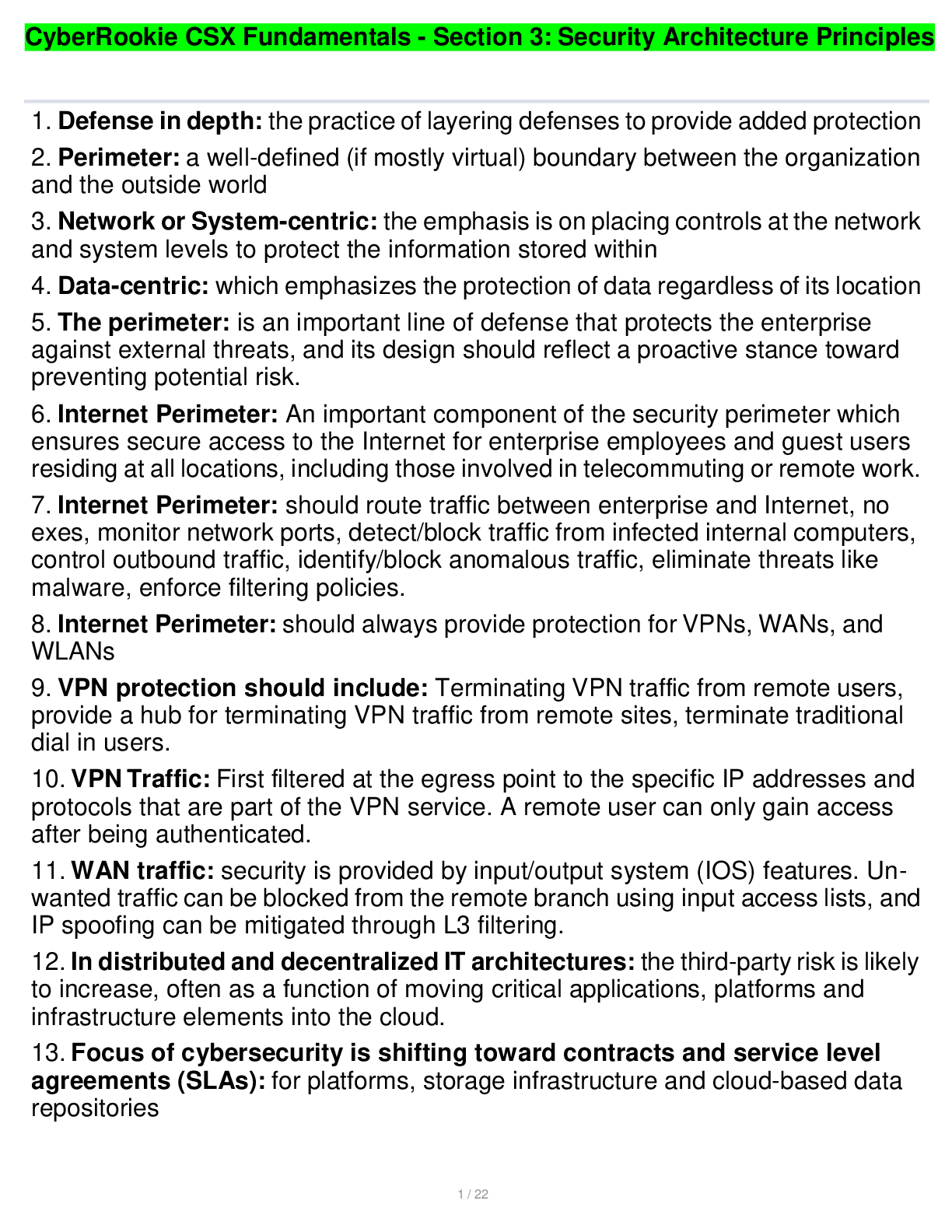
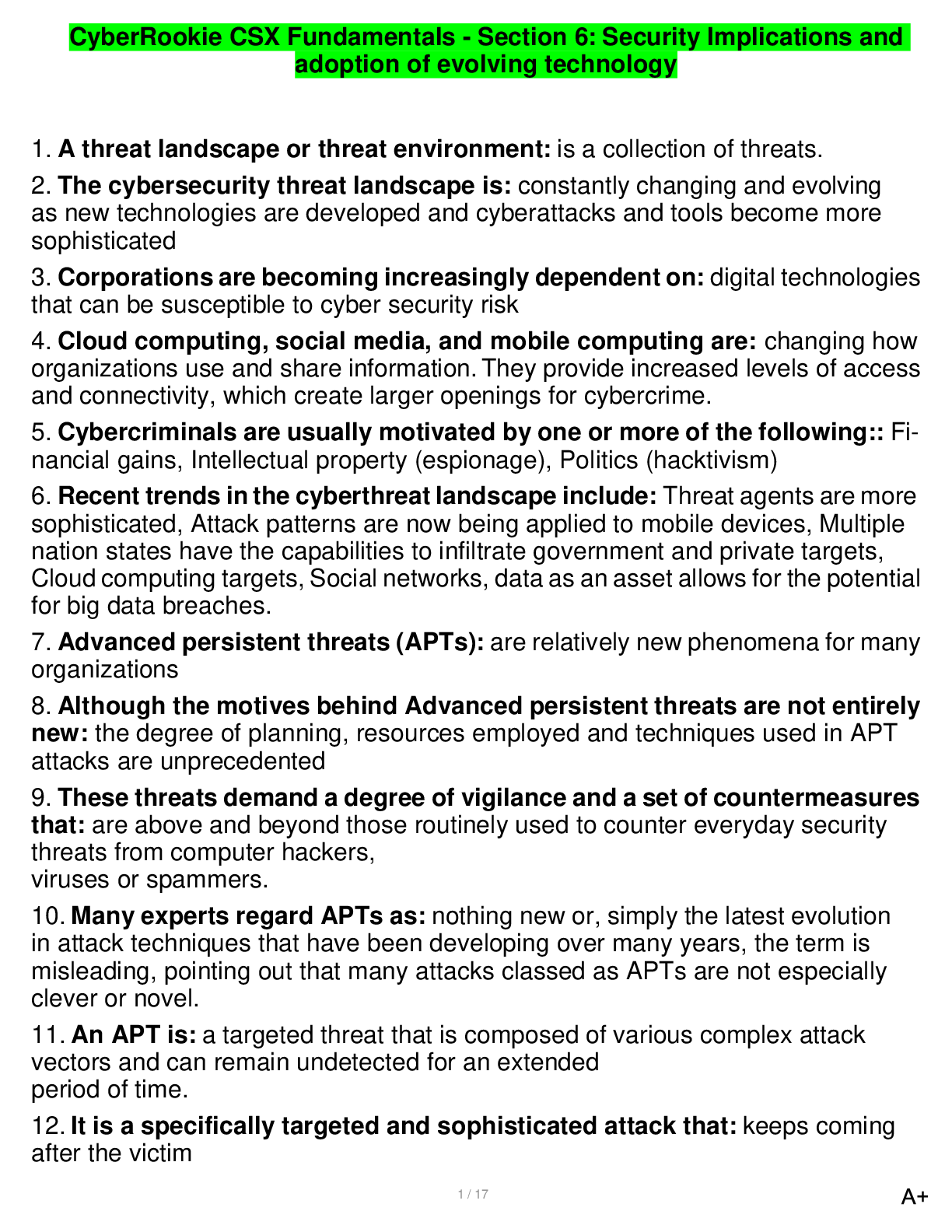
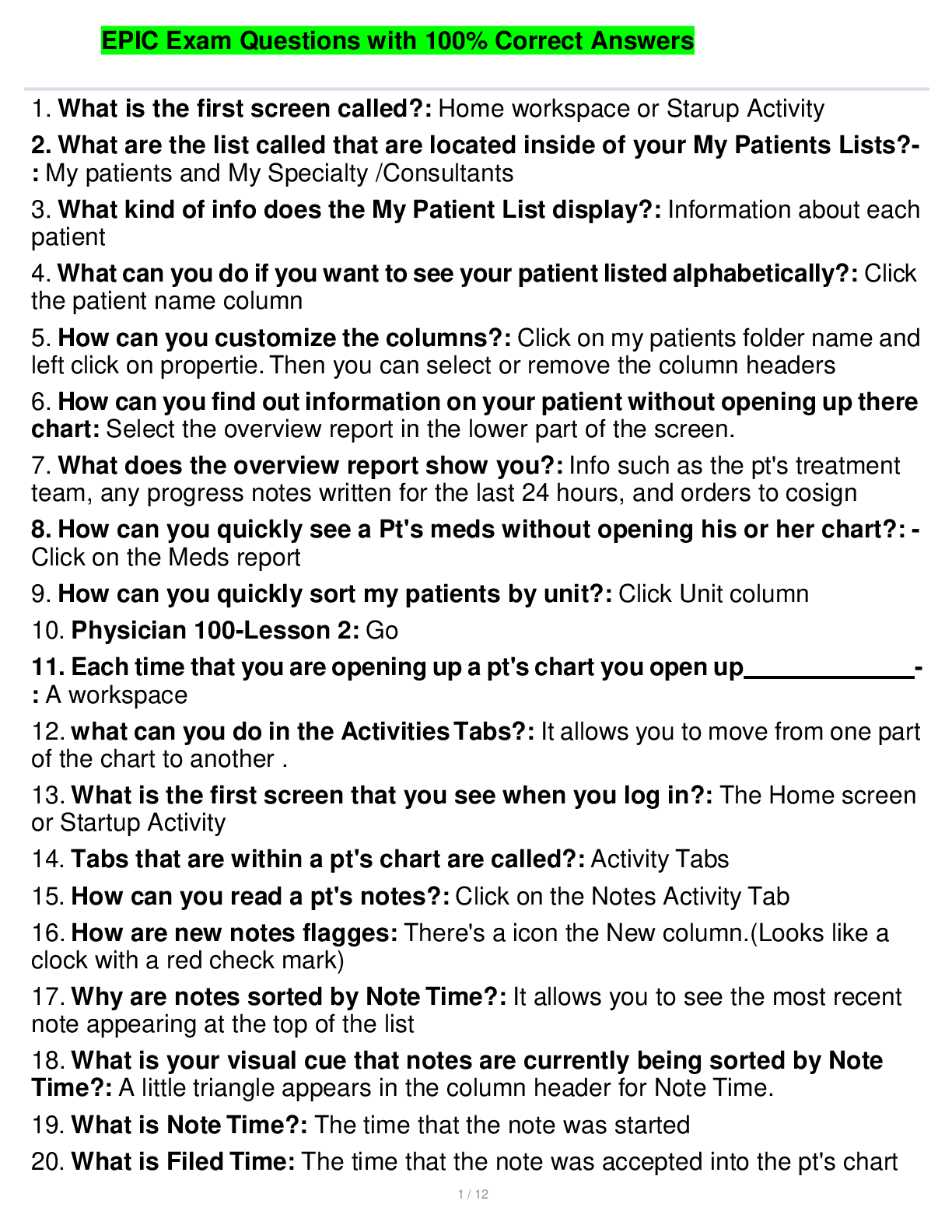

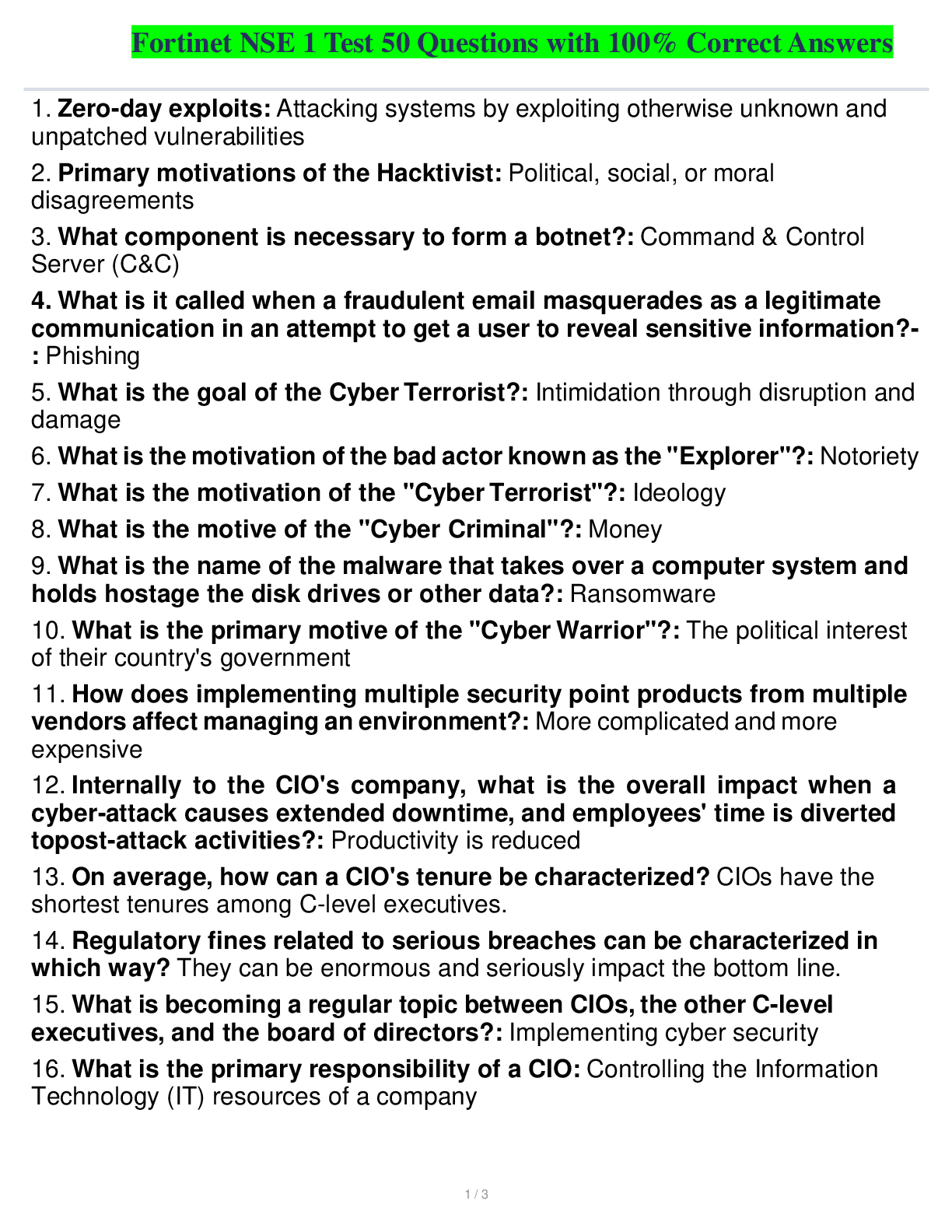
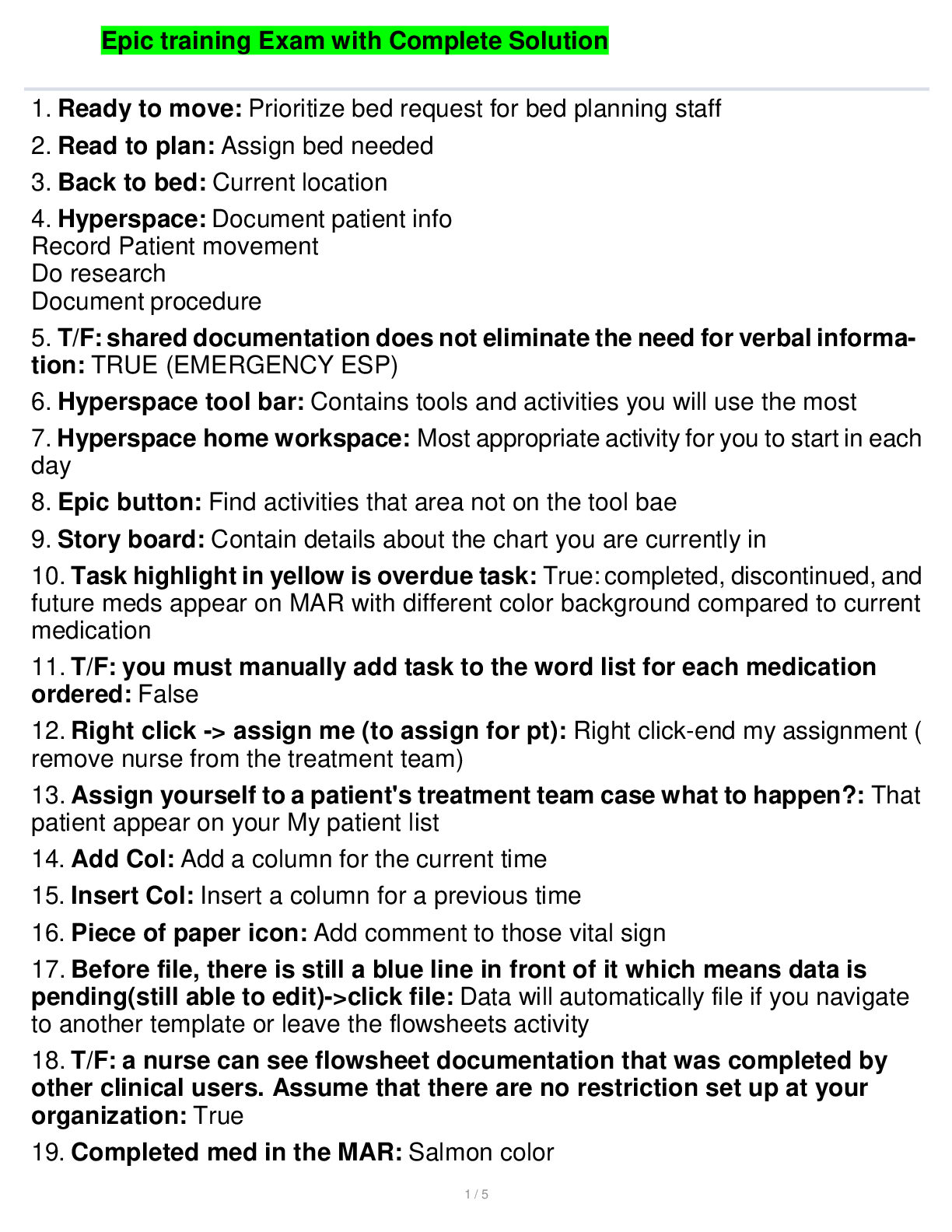
.png)
.png)
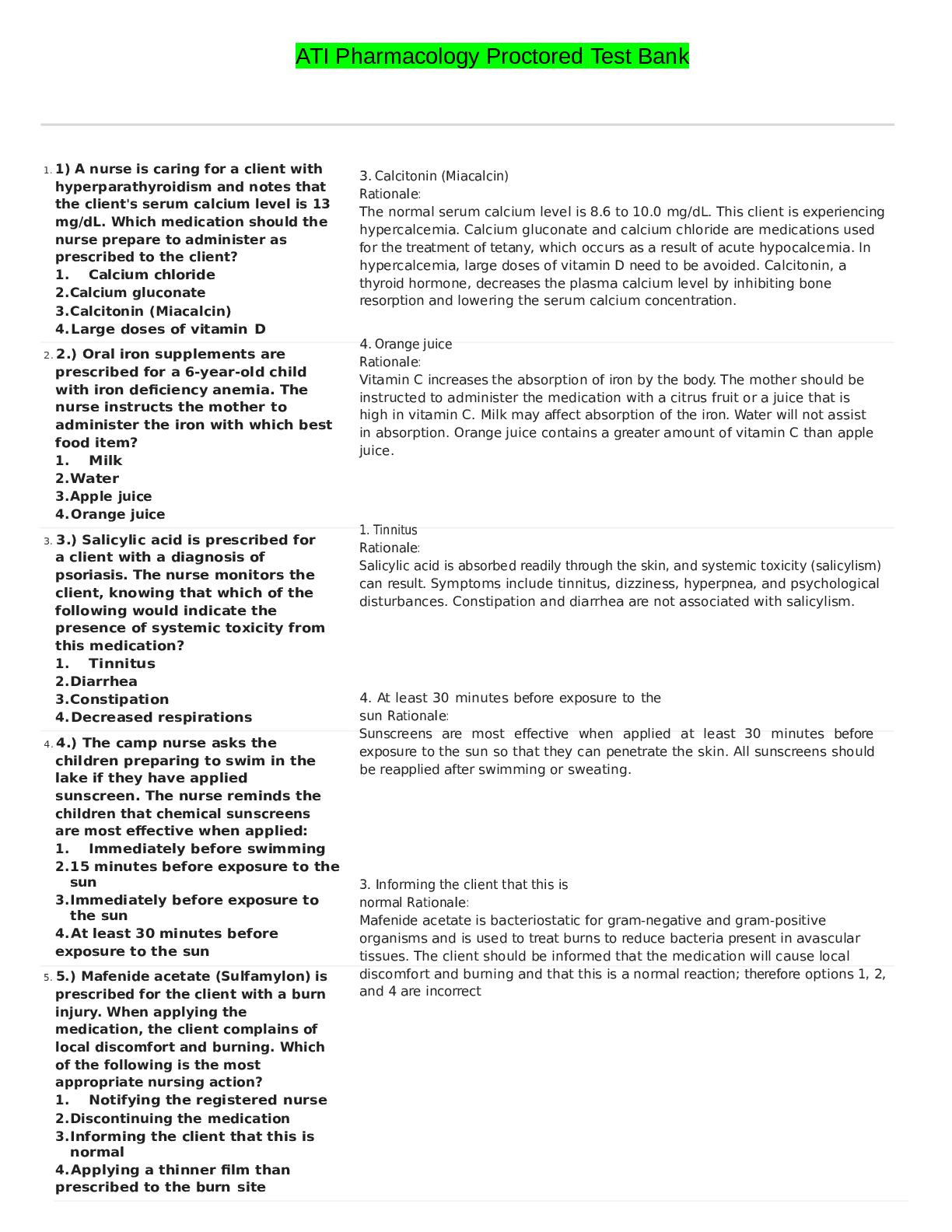
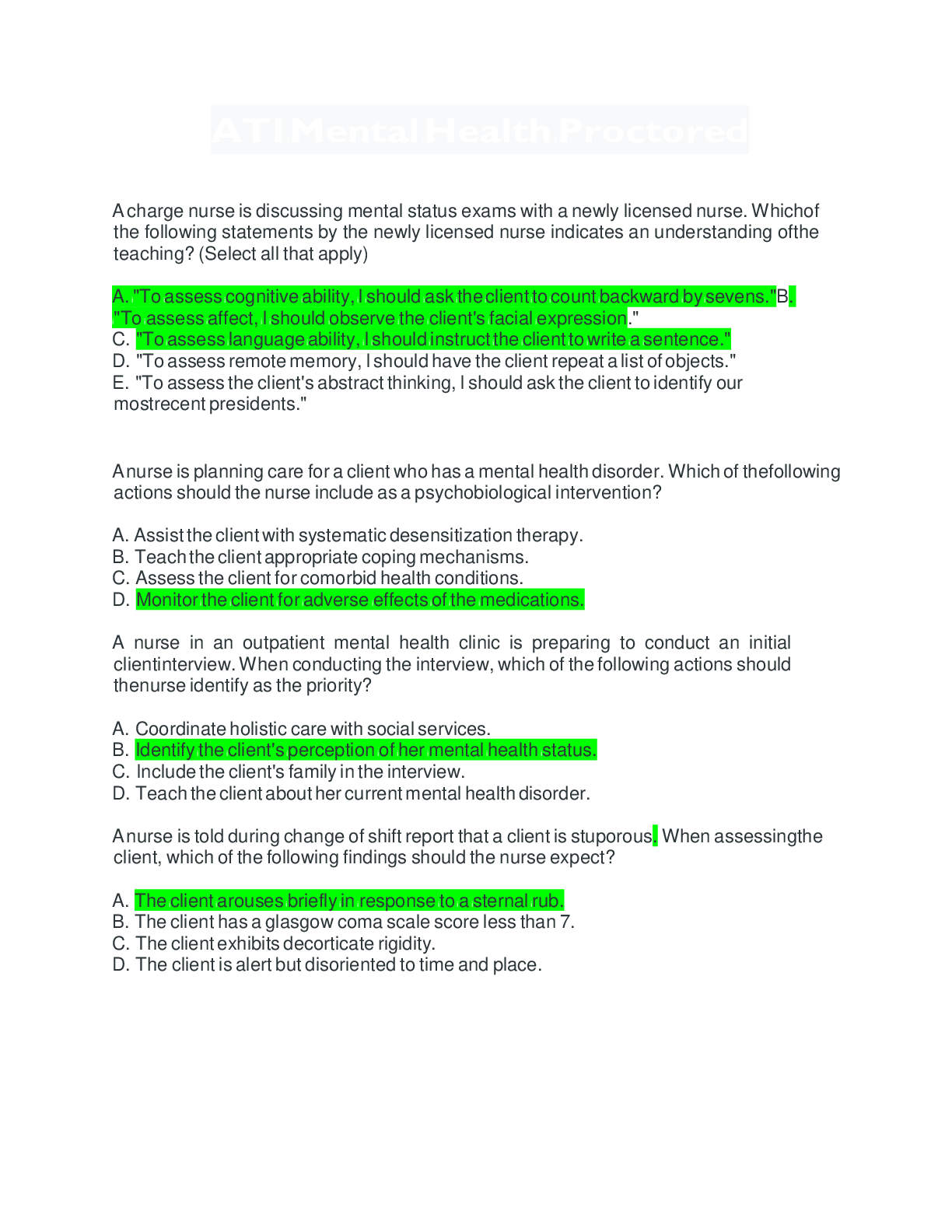
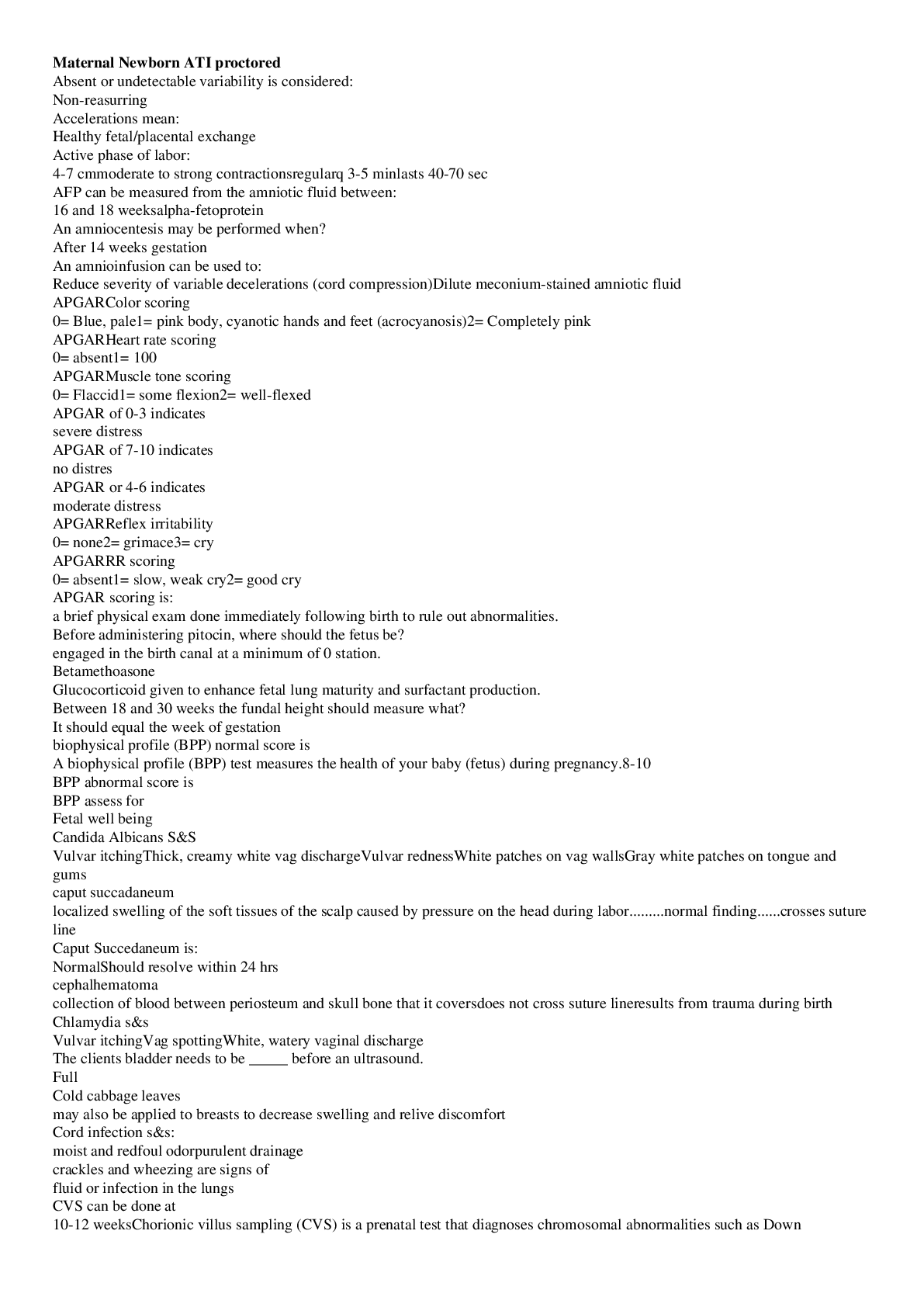
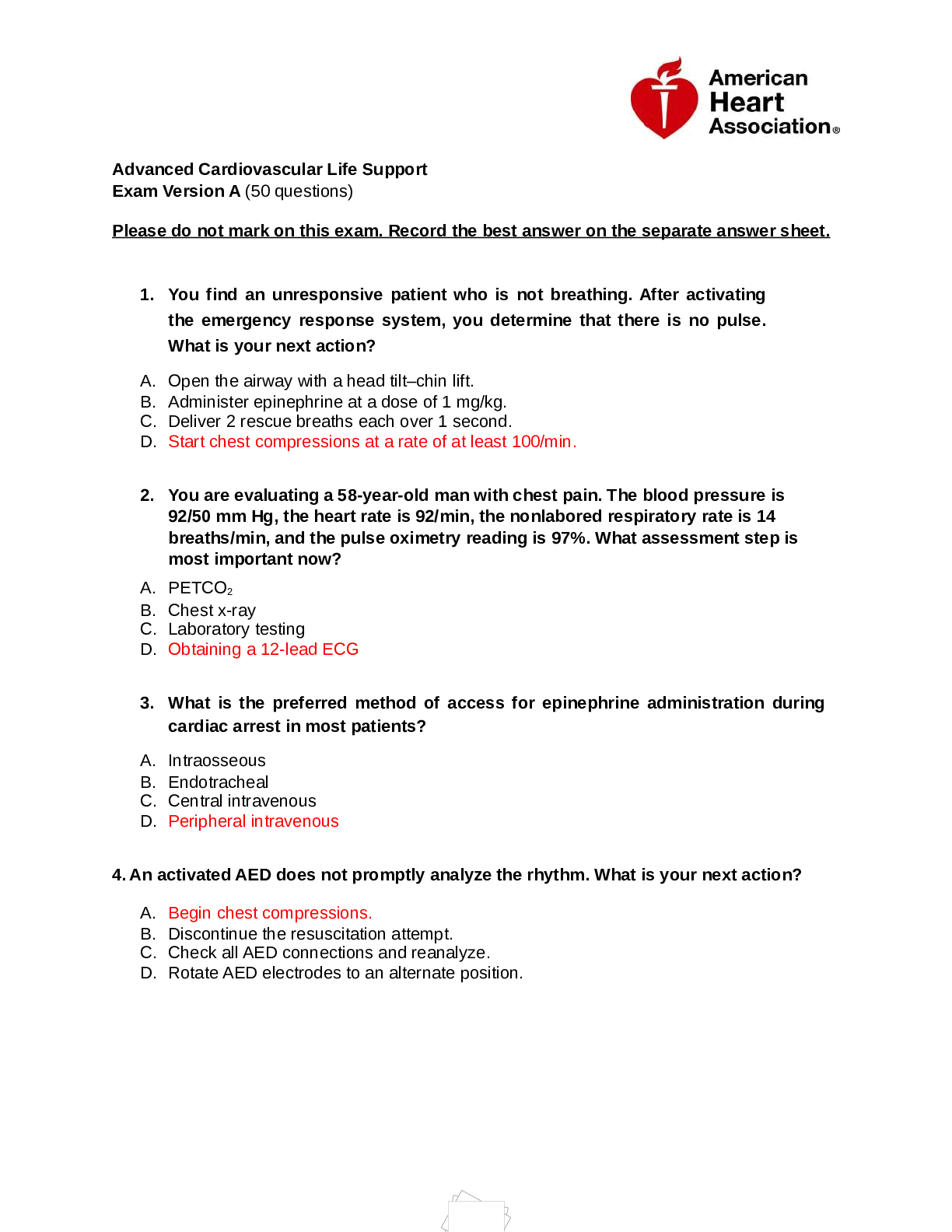

.png)
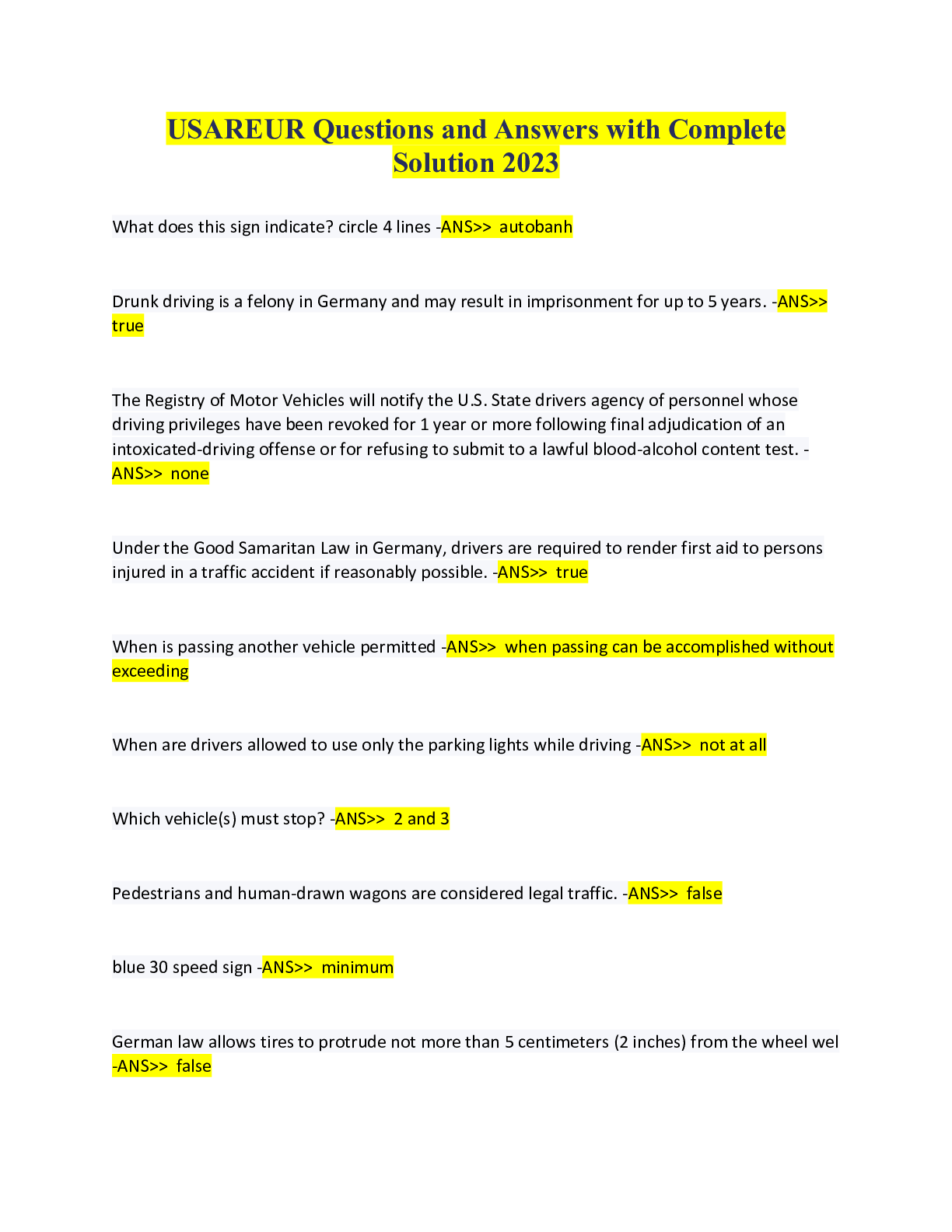
.png)
.png)
 A+ Guide.png)

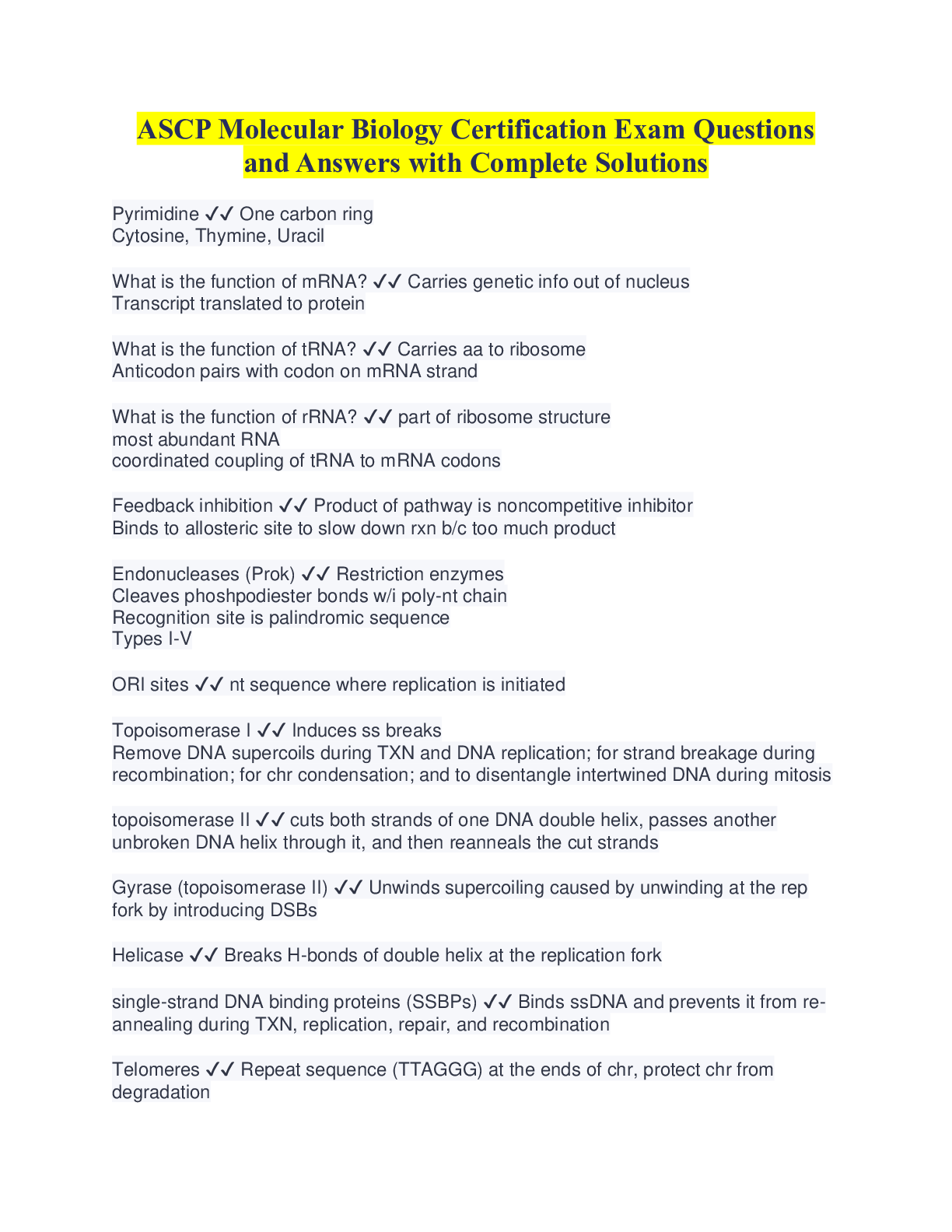
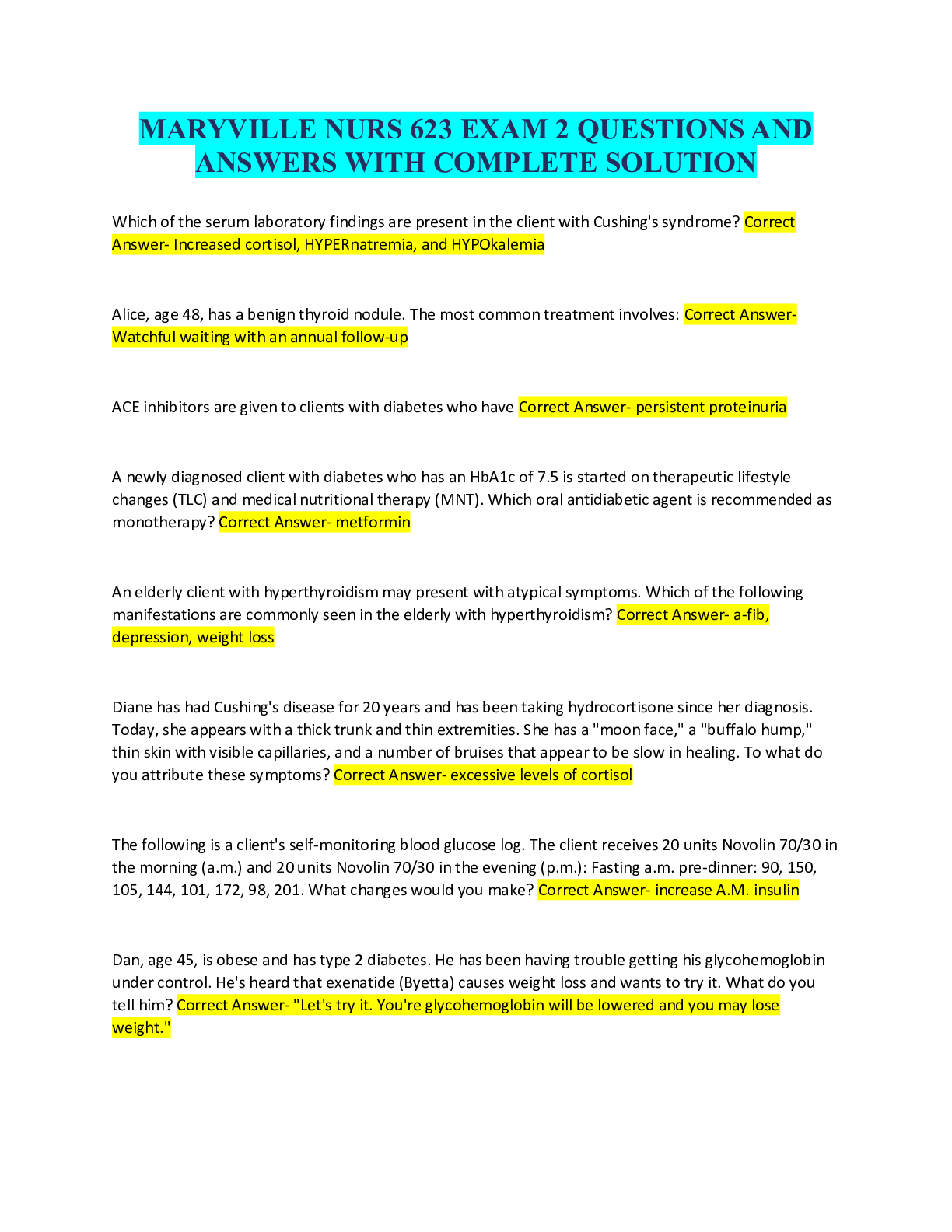
, Latest Questions and Answers with Explanations, All Correct Study Guide, Download to Score A.png)
, Latest Questions and Answers with Explanations, All Correct Study Guide, Download to Score A.png)
, Latest Questions and Answers with Explanations, All Correct Study Guide, Download to Score A.png)
, Latest Questions and Answers with Explanations, All Correct Study Guide, Download to Score A.png)

